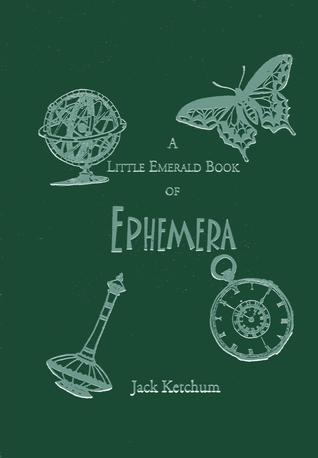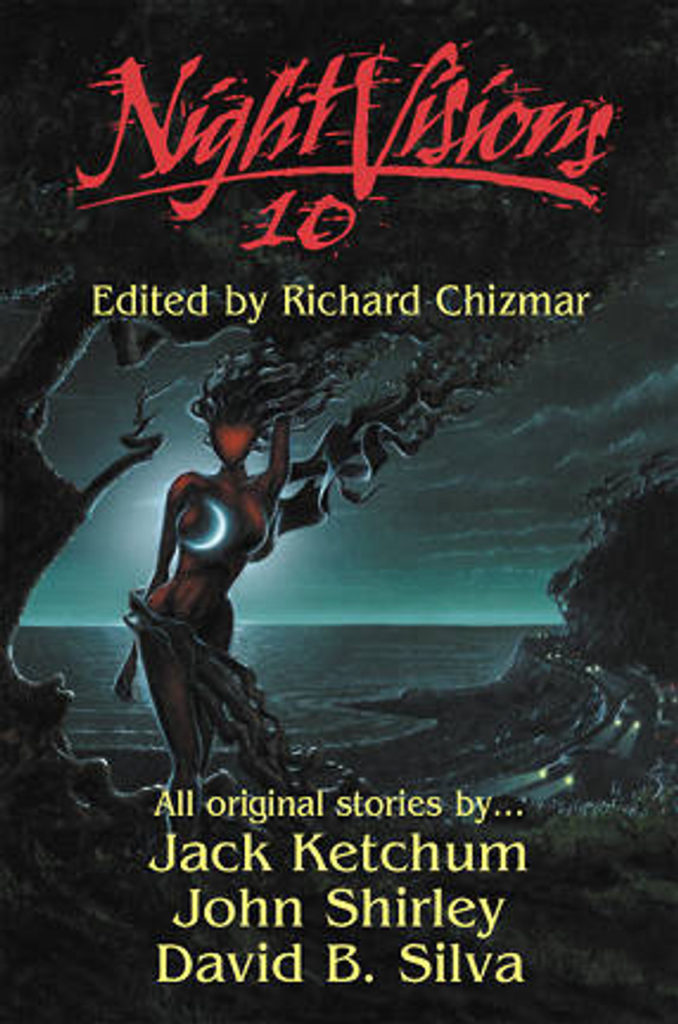I’ve never read any of Jack Ketchum’s fiction. I first heard of Ketchum (whose real name is Dallas Mayr), in early 2022. Mayr died in 2018, so he’ll never shake his head in misery that some unknown reader never came across his fiction while Mayr was alive. It’s not that I don’t own any fiction of Ketchum’s; I have all the copies of Subterranean Press’s attempt to revive Dark Harvest’s brilliant horror anthology series, Night Visions. The first of those copies, aka Night Visions 10, includes one Ketchum story, “The Passenger.” Yet, I’d never read that story.
I’d stumbled across these editions a few years ago, shelved them, and planned on reading the stories in Night Visions 10, 11, and 12, but this never happened. These three books were the only Night Visions books published by Subterranean Press, back in 2001, 2004, and 2006 respectively. Subterranean Press tried to revive a noted anthology twenty years after the last one appeared, but gave up after only three, whereas the original publisher, Dark Harvest, put out nine books between 1984 and 1991.
The original Night Visions books (of which I own all but #2) were unique horror anthologies. Each book contained stories by two known authors and one new writer. Published between 1984 and 1991, they included a variety of well-known names and few up-and-coming ones. Some of the memorable names include Stephen King, Robert McCammon, Clive Barker, Dean Koontz, and F. Paul Wilson. I’m not sure if the horror genre briefly died around in the early 1990s, or just the publisher, or both. I confess that I didn’t read keep up with the horror genre much, though I bought a few books and anthologies. I didn’t follow the market enough to hear about Ketchum, who apparently was a Big Name back then. He was a Big Name in the sort of violent horror tales that I avoided. You know: cannibals and brutal killers.
Lately, though, as I’ve picked up a slew of horror/dark fantasy collections and anthologies from back in the day (and by that I mean the 1990s through the early 2000s, when I mainly ready SF), I’ve come across writers who were big in those days and whose works I either missed or don’t remember. Ketchum is one of these writers, and, having read from cover to cover his book, certain thoughts struck me.

Ketchum’s volume from Borderlands Press, in their Little Books series is entitled A Little Emerald Book of Ephemera. There’s no fiction here; it’s musings about life, fiction, etc. Some of the entries are introductions or afterwords to new editions of his books. His idea of horror aligns with mine: people committing brutal acts, often for no reason. This makes him angry. I feel much the same way. Yet, in reading what he writes about his fiction, I’m not sure I want to read his fiction.
It sounds far more brutal than I think I’d care to experience.
Is that a bad thing, I wonder? Who will remember authors after they’re dead? Far fewer people than read them while he or she was alive. Some authors persist after they die, but these are few in number. Keep in mind that few living writers get published, and many of these rise briefly and then fall to mid-list or worse. From what I’ve read, Ketchum was mostly a paperback writer, and the market for paperback horror disappeared a few decades ago. Aside from a couple of names, such as Stephen King, the horror genre is not a major market. It seems, given the lack of success with the attempted revival of Night Visions, that even in the specialty press horror doesn’t have much of a market. In limited edition hardbacks, published in a few hundred copies, only the die-hard fan or collector will turn their eye (and wallet) to those books.

Sure, there’s still a strong degree of interest in horror, but it likely will never approach the success of fantasy of SF in terms of genre fiction. Ketchum writes, in one of his ephemera, that he sold 300,000 copies of his first book, Off Season. That sounds, at least to me, like a massive success. His later novels apparently didn’t sell as well, but, from what I’ve read, his focus in terms of the horror genre, was on the extreme edge, an uncomfortable edge.
My current fascination with Borderlands Press’s Little Books series is, I’ll admit, a strange one. Reading through some of these has revived a long-dormant interest in dark fiction. I find it interesting that the writers are given free rein: some submit fiction, others non-fiction. Some of the fiction is accompanied by notes about the stories, others included just the stories. Maybe’s there a word limit, and the writer is told: just give me X number of words, it doesn’t matter about what. After all, when you publish something in 500 copies, manic collectors will, like moths, gravitate toward these books. An edition of 500 copies is fewer than most specialty press editions of collections, though probably not by much. It’s hard to say, as not all small press publishers provide exact numbers. In the cases of limited and signed editions, the numbers are more obvious, but not always. Golden Gryphon, for example, listed most of their books as published in editions of 3,000. Other speciality presses aren’t as forthcoming. How many “trade” editions did Dark Harvest of Subterranean Press print in each Night Visions volume? Unknown.
So, in terms of these books, I always wonder: what’s the market? A book (or books) by a certain author will attract fans of that author. Books by certain publishers might attract fans of that publisher, regardless of author. Certain of those books become instant collector’s items, and quickly fetch premiums after publications. A few years ago I bought The Autopsy, a collection of most of Michael Shea’s fiction, published by Centipede Press. It was limited to 500 copies, all signed by Michael Shea, and listed for $125 upon publication. Search online now, and people are selling it for $1,400 or more. Many other Centipede Press editions accrue similarly in value. Ketchum himself mused upon a paperback edition of one of his books being listed for $85; no doubt any limited edition hardcover would fetch far more, especially signed ones, and especially now that he’s dead. Not all small press books attain this market value, but some are up there.
I’m rambling all over the place here… Having started with one writer and then deviating over to small press publishers. I’m going to say that, yes, I wish I’d known about Ketchum while he was alive. It would have made little or no difference. to his life, but maybe I would have picked up a book or two. There are many writers, in many genres, that I’m now reading for the first time who were alive and writing stories and novels a decade ago and who’re now dead: Charles Grant, Rick Hautala, Dennis Etchison. Then again, there are writers I’m also reading for the first time who are still alive, who have been writing for decades, or maybe only a few years. Grant and Etchison appear again and again in noted anthologies, and I wonder as I see their names, will they persist? Is it just Stephen King? Why not them?
I think I’ll stop here, although not far from my mind is the thought that after reading (or in some cases re-reading) anthologies published in the past 20-30 years, that many of the writers whose stories appeared in these anthologies are mostly forgotten. A handful of names persist, but the majority appeared a few times and then vanished.
What the hell happened to them? Where did they go? Will some of them say, “I’m still here?” Did others fade away, die, or quit? And if so, why? Even those who didn’t quit, now quickly before they are forgotten, at least by publishers?